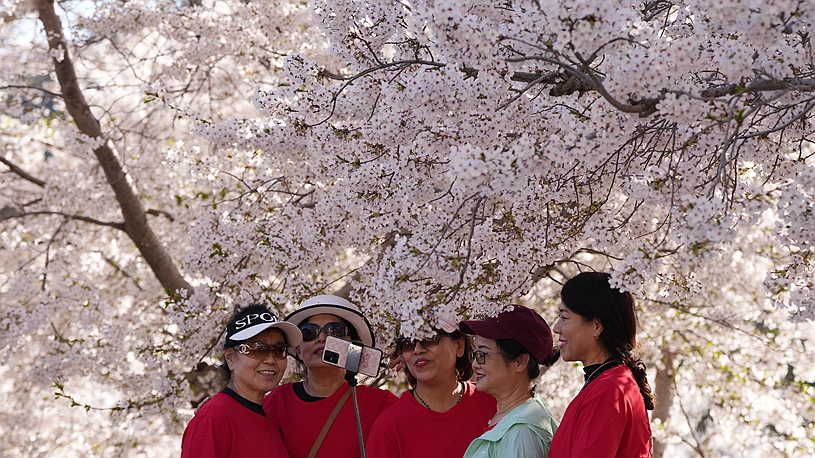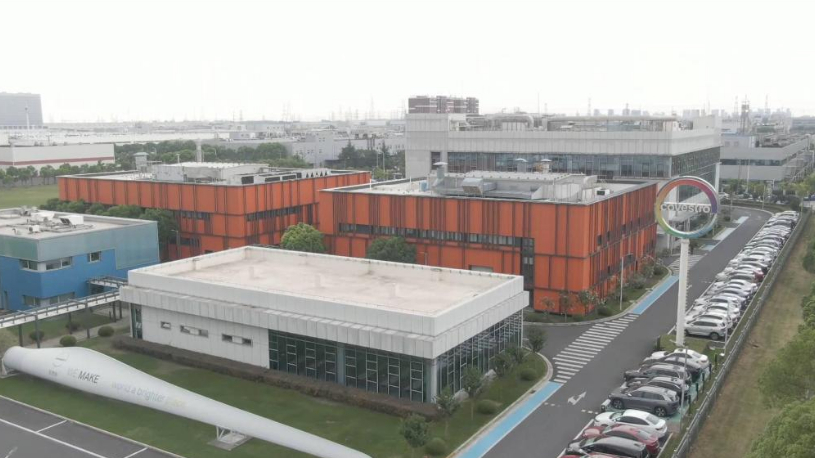BEIJING, April 20 (Xinhua) -- China's consumption played a vital role in bolstering economic growth in the first quarter of the year, underscoring the country's steady transformation toward a domestic consumption-driven economy.
China's GDP expanded 5.3 percent year on year in the first quarter (Q1), with domestic consumption contributing 73.7 percent to economic growth, data from the National Bureau of Statistics showed earlier this week.
Booming service consumption, especially festival-related consumption, and the continuing structural upgrading of household consumption were among the major highlights of the consumption sector.
NEW FORMS OF CONSUMPTION
China has witnessed a rapid development of new consumption patterns across a wide range of sectors from entertainment and tourism to the digital industry.
For instance, city walks have become a trending pastime for Chinese. The walks involve immersive exploration of the city on foot to discover historic landmarks, cultural sites and unique spots.
"City walks allow me to deeply experience local culture. It's really a good choice," said a traveler surnamed Chen from Anhui Province.
Home-grown brands have also become a hit among Chinese consumers. Sales of horse-face skirts and neo-Chinese jewelry rose 6.3 times and 1.7 times from a year earlier during the first two months of 2024.
The rise of a new "Made in China" is just the start of a revolution, fueled by a young generation that have growing love for the country, analysts said.
Besides, the sports economy has thrived with rising public health awareness. Sales of running shoes, quick-dry clothes and other outdoor sports equipment are booming in first and second-tier cities.
"The change in consumption pattern should not be misinterpreted as a 'consumption downgrade'," said Xu Guangjian, deputy head of the Price Association of China.
SUSTAINED RESILIENCE
Continued urbanization and rising income levels are the main drivers of China's sustained consumption resilience.
By the end of 2023, approximately 66.2 percent of the total population in China lived in cities, still lower than the average level of around 80 percent in developed countries.
It is estimated that every one percentage point increase in the urbanization rate will translate to an additional 200 billion yuan of consumption demand.
At present, there are still 170 million migrant rural workers and their family members who have not yet gained permanent residency in cities.
If they are granted urban residency and enjoy the same basic public services as urban residents, their consumption levels are expected to rise by 30 percent in real terms, studies have shown.
China's resident income growth has basically kept pace with the country's economic growth, and the income gap between urban and rural residents has narrowed.
Official data showed that China's per capita disposable income stood at 11,539 yuan (about 1,624.57 U.S. dollars) in Q1 2024, up 6.2 percent year on year.
Urban per capita disposable income came in at 15,150 yuan, up 5.3 percent, while that for rural residents rural areas stood at 6,596 yuan, up 7.6 percent.
China's job market has shown overall improvement thanks to the continuously recovering economy and pro-employment policies.
"Our sense is that there is a small but growing sentiment of white collar employees that the market situation is improving and this is also leading to greater willingness to spend," said Ben Cavender, managing director at Shanghai-based China Market Research Group.
He said some companies were thinking about how to grow their business in China again after years of holding off on investing, which was helping sentiment to improve.
"Resident incomes are rising and employment is improving, which is conducive to enhancing people's ability to consume," said Sheng Laiyun, deputy head of the National Bureau of Statistics.
POLICY INCENTIVES
China has vowed to expand domestic demand and promote sound economic flows, while promoting steady growth in consumer spending this year.
Last month, the State Council issued an action plan containing detailed measures to promote a program designed to boost equipment upgrades and trade-ins of consumer goods.
The government will provide tax incentives and interest rate subsidies for firms involved in equipment upgrades, and give subsidies to consumers who scrap high-emission passenger cars to buy energy-efficient vehicles or new energy vehicles.
For used home appliances, the country will provide financial support to establish recycling systems for renewable resources. Local governments and home appliance companies are encouraged to offer subsidies or preferential policies for consumers who purchase or trade for green and smart home appliances.
"This market space is very huge, and the program will not only boost consumption and investment but also promote energy conservation and high-quality development," said Zhao Chenxin, deputy head of the National Development and Reform Commission.
According to Sheng Laiyun, the country's consumption potential is still huge, with a market of more than 1.4 billion people and a continuously upgrading consumption pattern.
"I expect China's consumer market to continue to improve, and that consumption will continue to play the role of 'a ballast stone' for stable economic growth," said Sheng. ■












